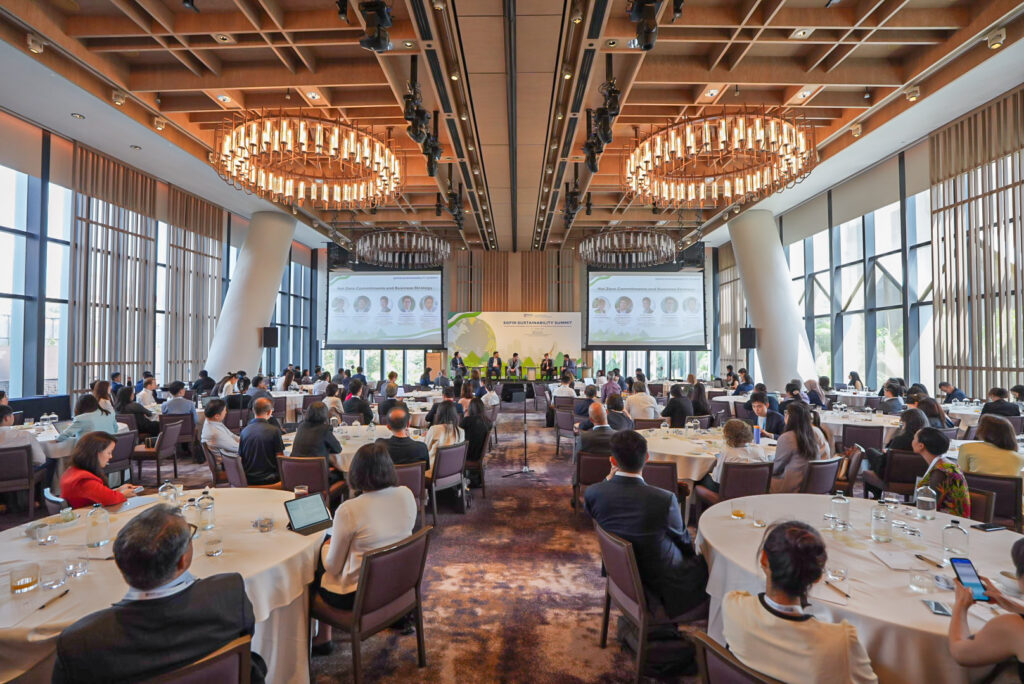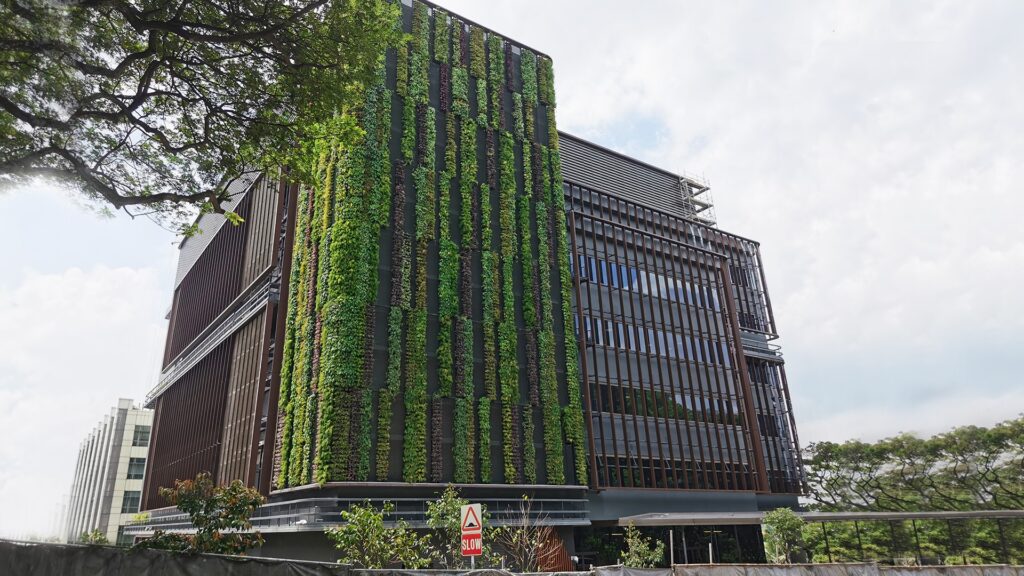Singlife-SGFIN Sustainable Future Index 2026: Gen Z Leads in Sustainability Awareness, Older Singaporeans Lead in Action
The Singlife–SGFIN Sustainable Future Index 2026, jointly developed by Singlife and Sustainable and Green Finance Institute (SGFIN), examines the intrinsic drivers shaping sustainability behaviours among Singaporeans. The SGFIN team comprise of Deputy Director Prof Weina Zhang, Michael Aleander, Bhairavee Deepak Wagh, and Asda J Pandiangan, have developed the survey questions based on behavioural framework encompassing awareness, knowledge, and ownership, and compute the index. Such approach aims to identify the gaps between sustainability intentions and actions and propose possible solutions going forward.
Singlife Press Release | Singlife Report | SGFIN Sustainable Finance Case Competition 2026 | Asia Insurance Review article | Singapore Business Review article | ESG Business article | Newsflash Asia article
Counting Carbon in MICE
Associate Professor Zhang Weina (Department of Finance) explained how large-scale MICE events generate carbon emissions across areas such as travel, catering and booth construction. Using SGFIN’s carbon calculator, she demonstrated how emissions can accumulate, underscoring the importance of measuring carbon impact as a first step towards more responsible event planning. Similar posts were shared on Facebook and TikTok.
Scaling SME Sustainability Through Non-Financial Innovation
As part of its mission to advance sustainable finance and support SME transition around the world, SGFIN contributed a case study to the “SME Best Practice Guide” published by International Finance Corporation (IFC) SME Finance Forum to share the insights on how non-financial services can unlock sustainable finance for SMEs. SGFIN’s Deputy Director, Associate Professor Zhang Weina, together with Research Associate Allan Loi, presented a Singapore-based ESG data solutions provider – ESGpedia. The case exemplified how non-financial service providers—through access to sustainability advisory, ESG data infrastructure, reporting tools, and capability development—embedded in a data-driven, partnership-led ecosystem, has enabled over 1,000 SMEs enhanced access to sustainable finance, increased competitiveness, and embedded decarbonisation strategies across regional supply chains.
Digital Convenience, Real Carbon Costs
Associate Professor Zhang Weina (Department of Finance) highlighted the three platforms with the highest carbon footprints are Netflix, Zoom and TikTok, due to high-resolution video streaming and cloud data storage. She also noted that activities such as conferences, workshops and seminars can generate substantial carbon emissions. See similar posts on Facebook and TikTok.
Sustainable Aviation Fuel Levy Explained
Associate Professor Zhang Weina, Deputy Director of SGFIN commented that the sustainable aviation fuel (SAF) levy on outbound cargo will likely be passed on to end customers. This may negatively impact the price competitiveness of Singapore’s exports. However, as transit and inbound cargo will be exempt from this levy, the impact on companies using Singapore as a transit logistics hub will be minimal. She added that the efficiency and reliability of the Singapore’s airports far outweigh the cost of the levy. The SAF levy is necessary and crucial to building a low-carbon aviation ecosystem in the long term.
Finance as a Catalyst for a Sustainable Future
In a compelling episode of the AIB Podcast, Professor Johan Sulaeman, Director of SGFIN, shared how green finance is reshaping the future of capital allocation. Moving beyond traditional profit-driven models, green finance is emerging as a strategic lever to drive long-term environmental and social value. Prof Johan highlighted the urgent need for clearer impact metrics, inclusive transition frameworks, and cross-sector collaboration to unlock scalable climate solutions. This timely conversation offers deep insights into innovation, climate finance, and the path to COP30, reinforcing SGFIN’s commitment to advancing financial practices that deliver lasting value for investors, society, and the planet.
Shaping Asia’s Net-Zero Future
With the closure of the Net-Zero Banking Alliance, Prof Johan Sulaeman, Director of SGFIN, highlighted a pivotal moment for Asian banks and regulators. He emphasized that transparency, consistent climate disclosures, and stronger accountability are essential to maintain credible net-zero commitments. While the absence of a global oversight body creates challenges, it also presents a rare opportunity: banks can take direct ownership of their decarbonisation journeys, aligning strategies with regional and sectoral realities. Prof Johan called on regulators and industry groups to provide guidance and frameworks that ensure progress remains measurable, transparent, and impactful.
Singapore’s Multibillion-Dollar Events Industry has a Hidden Cost
For too long, the environmental cost of major events have been discounted – invisible behind ticket sales and headline attendance. In the Straits Times, Associate Professor Zhang Weina and Yannis Yuan propose that Singapore’s Meetings, Incentives, Conferences, and Exhibitions (MICE) industry must measure and disclose its true carbon footprint to stay competitive on the global stage. SGFIN’s new MICE carbon calculator turns unseen impacts into actionable data, helping organisers pinpoint real emission drivers and make meaningful reductions. By linking accountability to industry incentives and standards, Singapore can lead the world not only in hosting world-class events, but in ensuring they align with climate responsibility.
The Straits Times article | SGFIN MICE Carbon Calculator | SGFIN Whitepaper | LinkedIn Post
Climate Resilience Starts with Finance
Finance sits at the centre of climate resilience – a key insight from Professor Johan Sulaeman, Director of SGFIN, in his keynote address at the International Corporate Governance Conference 2025. Drawing on SGFIN’s research, he illustrated how financial systems connect three critical domains: local adaptation, carbon markets, and global capital markets. By expanding farmer financing, enhancing carbon market transparency, and embedding sustainability into investment decisions, SGFIN is shaping how capital can be mobilised to drive measurable climate resilience across ASEAN and beyond.
Singapore’s Green Fuel Levy: A Step Forward but Harder Work Awaits
In a Business Times commentary, SGFIN’s Deputy Director Assoc Prof Zhang Weina, together with Michael Alexander, Fanny Xueqi Or, Jiaxin Zhang, and Feimo Zhang, discussed the challenges and opportunities of developing a sustainable biofuel industry. Using Singapore’s new sustainable aviation fuel levy as context, the article highlights that while the levy is an important first step in decarbonising aviation, SGFIN also calls for strengthening biofuel producers’ resilience through circular business models, fostering innovation, introducing supply-side incentives, and advancing regional collaboration across ASEAN.
Business Times article | BizBeat NUS article | SGFIN Whitepaper | SGFIN LinkedIn post
What Is the True Value of Green Buildings?
In this article published in Urban Solutions (Issue 27), a bi-annual publication by Centre for Liveable Cities (CLC), Associate Professor Zhang Weina (Deputy Director of SGFIN), together with SGFIN researchers Fanny Xueqi Or, Feimo Zhang, and Jefferson, examines how cities can move beyond conventional financial metrics to capture the integrated value of green buildings and sustainable and regenerative urban development. Drawing on SGFIN’s Integrated Return on Investment (IROI) framework, the article shows how Financial, Environmental, Social, and Governance outcomes can be systematically measured and monetised across buildings and districts. Through empirical case studies in NUS SDE4 Net-Zero building, UWCSEA Dover Campus and Jurong East District, the article highlights how the IROI framework can inform investment decisions, align stakeholder incentives, enable long-term interventions through continuous improvement, and facilitate transitions at the precinct and district scale. By translating the outcome metrics into a holistic and comparable monetary term, IROI bridges the gap between technical interventions and financial decision-making, allowing developers, investors, users, and policymakers to speak a common language.
Beyond “Green” – Financing for Real Ecological Impact
Sustainable finance must move past generic “green” claims to deliver tangible environmental outcomes. In The Business Times and CETEX publication, Professor Johan Sulaeman, Director of SGFIN, highlights the need for green loans to be backed by measurable biodiversity metrics. Ecological costs — such as land clearing and vegetation loss — should be transparently assessed to ensure credibility. By integrating biodiversity safeguards, ecological data, and long-term environmental performance into sustainability-linked loans, financiers can strengthen market integrity and align with public expectations. This shift positions sustainable finance as a powerful tool for real ecological progress, not just symbolic gestures.
Business Times article | CETEX publication | SGFIN LinkedIn post












